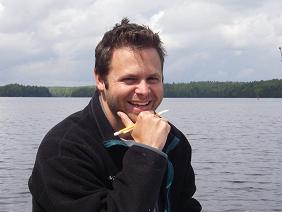
My objective as an educator is to assist students in developing skills to address complex issues and problems and to foster a passion for life-long learning. I consider student to be a broad term, incorporating not only the undergraduate and graduate students at the learning institution, but also members of the public, peers, and of course, myself. The educational process starts by providing learners with strong backgrounds in principles and mechanisms, and then providing them with interactive opportunities to actually apply this knowledge to simulated and real world problem solving scenarios.
To that end, I attempt to integrate my research program with my teaching and mentoring responsibilities. This type of approach promotes future researchers and future research. Hands on research is essential in helping students at all levels develop skills necessary to succeed in many fields. I authored a paper earlier in my career entitled "Undergraduate education: making the most of opportunities in fisheries science" which emphasized this fact. It is my belief that students should be engaged in active communication from day one at university. Far too often, students reach their senior undergraduate year and they don't have experience in delivering presentations, leading discussion groups, providing critical assessments of research findings, or putting their own thoughts on paper to succeed in graduate school or elsewhere. The undergraduate experience demands and deserves more than memorization followed by multiple choice exams. I endeavor to engage students in activities that develop critical thinking, issue identification, and knowing how to test or address questions or problems. To that end, I am particularly interesting in using problem-based learning modules to develop these skills among students. This is particularly important for non-science students who benefit from group activities with peers.
I also feel it is important to assist in orienting students to their desired discipline by providing them with information on different professional societies that can expand their horizons and provide opportunities to network and to gain experience in professional service. As Past President of the Student Subsection of the American Fisheries Society, I am acutely aware of the value of actively participating in professional societies. Organizational, leadership, and communication skills will benefit students in both the short and long terms. I will continue to work towards creating student opportunities and look forward to being in a position to offer my perspective as a recent graduate to those embarking on their own careers.
Mentoring is an important component of the education process. An important role of a mentor is assisting students in developing aspirations and goals. Candid communication with students to determine what they wish to do with their career and where they see themselves in several monthes or years is essential. The task of the mentor is to facilitate students achieving their goals. Another important aspect of the mentoring and learning process is to receive feedback from students. How do you know when you have been successful as an educator and mentor? I believe that conventional indicators such as grades and the successful completion of a thesis are important; however, true success can only be gauged by less tangible measures. As long as the students are making a difference using the skills they have developed, including communication and problem solving, one can feel a sense of accomplishment as an educator. Indeed, perhaps one can judge success best by the learning legacy that is imprinted upon or shared with their students. Highlighting my commitment to lifelong learning, I co-organized a symposium in 1999 on this topic at a fisheries meeting and delivered a presentation entitled "Commitment to lifelong learning: the influential role of motivation in undergraduate learning processes". My preparation for that presentation helped to focus my educational philosophy and has stimulated my interest in understanding the learning process to be a better educator.
Many of the courses offered in the biological sciences can be developed or revised to include field or other experiential modules to enhance the realism and utility of these courses. Class based learning can be supplemented with co-operative education which provides an effective mechanism for providing students with real world experience. I am also a strong advocate of field courses. From spending many days at biology stations in Alberta, British Columbia, Ontario, Illinois, Ohio, and the Bahamas, I have seen students participating in field based experiential learning. These active learning experiences are invaluable in several respects, including exposing students to diverse habitats, as well as to the cultural diversity of field sites.
In addition to formal learning in academic institutions, I am a firm believer in sharing knowledge with the public. Since mid-way through my high school experience, I have been involved in providing environmental outreach in my capacity as assistant communications officer and resource interpreter with a provincial government agency, as conservation director for an angling club, and as a concerned and passionate professional in environmental science. This experience has assisted me in determining what is an appropriate message for a given target audience, and what is the best means for delivering that message to them. For several years, I visited schools and took school groups to local conservation areas and delivered programming on wetland ecology, aquatic conservation, and resource management. I know the value of outreach because it was a similar program that really captured my interest in ecology and conservation as a youth.
-S.J. Cooke |
